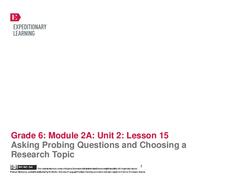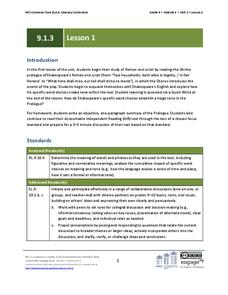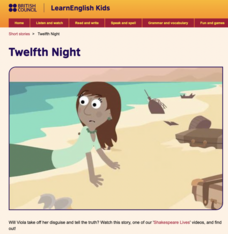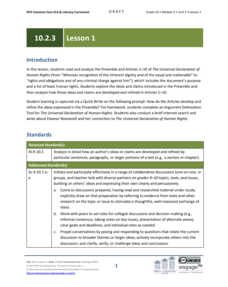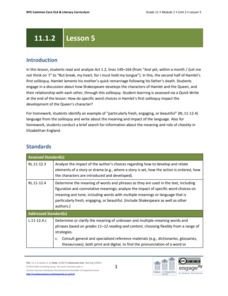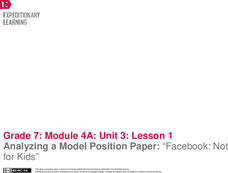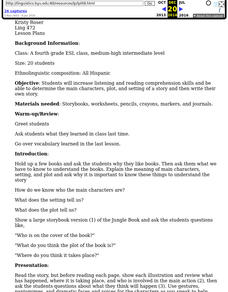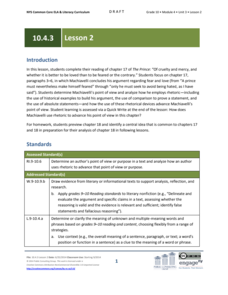Scholastic
What’s the Good Word? Etymology Project Guidelines
Who named the shapes, or the days of the week? Should words be removed from the dictionary if they're no longer commonly used? Are there too many words in the English language? Language arts students explore these and additional...
EngageNY
Inferring About Character: Atticus (Chapter 5)
As part of their study of Harper Lee's To Kill a Mockingbird, class members participate in a silent discussion of the novel using a Chalk Talk chart. They then respond to the teacher's questions by writing their thoughts on the chart....
Curated OER
Beginning Daily Activities Unit
Begin each day with a warm-up that has ELLs focusing their minds on a skill that will be taught that day. Focusing on verbs, each daily lesson reinforces study and self-management skills, helps learners become proficient in working with...
National Center for Families Learning
The Summer Fun Summer Learning Poetry Unit
Focus on poetry this summer to enhance those comprehension, fluency, and language skills with a set of resources intended to explore different types of poetry, specifically lyric poetry. The daily activities contain differentiation ideas...
Curated OER
Order! Order!
Polish organization skills in your youngsters. With this lesson, they are introduced to the trait of organization and participate in activities that reinforce organization. They cut apart a familiar story, receive different...
Curated OER
Hot Spots
Keep an eye on progress with reading and vocabulary using pink and green sticky notes. This resource describes how to set up the sticky note system so that learners can note difficult passages, and teachers can track ability.
Teach-nology
Being a Comedian Isn’t All Laughs
What's it like to be a comedian? Find out with a short cloze passage about the life of a comedian. Kids use eight words at the bottom of the page to fill in the blanks throughout the passage.
Novelinks
The Little Prince: Concept/Vocab Analysis
Focus on the literary elements of Antoine de Saint-Exupéry's The Little Prince with a concept analysis sheet. With suggestions and explanations for many of the book's concepts, vocabulary, and other issues that may arise in...
EngageNY
Asking Probing Questions and Choosing a Research Topic
Begin the writing journey of an evidence-based essay detailing a rule to live by with various activities to familiarize learners with the topic and jump-start brainstorming. First, pupils take part in an in-depth review and discussion of...
EngageNY
Grade 9 ELA Module 1: Unit 3, Lesson 1
Class members begin their study of Romeo and Juliet by examining the words Shakespeare chooses in the Prologue to Act I to create the tragic tone of his famous play about star-crossed lovers.
EngageNY
Grade 9 ELA Module 1: Unit 3, Lesson 13
Readers examine the conversation between Friar Laurence and Romeo in Act 3, scene 3 of Romeo and Juliet and consider how Shakespeare's word choices impact the development of Romeo's character.
EngageNY
Grade 9 ELA Module 1: Unit 3, Lesson 14
After watching the scene from Romeo + Juliet in which Juliet argues with her parents because she does not want to marry Paris, groups do a close reading of Act 4, scene 1, lines 44-88, examining the word choices in the conversation...
British Council
Twelfth Night
Scholars experience Shakespeare's, Twelfth Night, with an engaging interactive. After watching the story, six activities extend the learning experience. Topics include characters, vocabulary, a sequence of events, comprehension, and...
EngageNY
Grade 10 ELA Module 2: Unit 3, Lesson 1
Scholars examine the Universal Declaration of Human Rights and analyze the ideas in the preamble. Readers define new vocabulary words, listen to a Masterful Reading, answer questions in pairs, participate in a jigsaw discussion, and...
EngageNY
Grade 10 ELA Module 4: Unit 2, Lesson 7
One sentence, so much meaning. Scholars analyze a quote from Act 2.3 of Shakespeare's Macbeth and explore the plot in a jigsaw discussion.
EngageNY
Grade 10 ELA Module 4: Unit 2, Lesson 13
Lady Macduff uses a metaphor to suggest that her husband does not possess the courage of even a tiny, short-winged bird—ouch! Using the resource, pupils discover Act 4.2 of Shakespeare's Macbeth. Using reading, writing, and discussion,...
EngageNY
Grade 11 ELA Module 1: Unit 2, Lesson 5
Scholars delve into Act 1.2 of Shakespeare's Hamlet. By completing a writing exercise and participating in a class discussion, they continue to analyze how the author develops the characters in the play.
EngageNY
Grade 11 ELA Module 2: Unit 1, Lesson 14
Leave the past in the past. Scholars read paragraph 12 of the chapter "Of Our Spiritual Strivings" to analyze Du Bois's development of gaining liberty and leaving the ideas of the past. Pupils then carry out a three to five-minute...
EngageNY
Analyzing a Model Position Paper: “Facebook: Not for Kids”
It's time to take a position! Scholars learn to write a position paper by analyzing a model paper titled Facebook: Not for Kids. After studying the model paper, learners think about their own papers using the Position Paper Planner. They...
Curated OER
Language Practice
The simple instructional techniques described in this plan will help young readers learn and practice basic reading skills and strategies. Before reading, introduce your readers to the meaning of main character, setting, and plot. Then...
EngageNY
Grade 11 ELA Module 1: Unit 2, Lesson 2
What tools did Shakespeare use to develop his characters in the play Hamlet? With the resource, pupils engage in a discussion about how the character Claudius introduces and develops Hamlet. They explain how word choices in Claudius's...
EngageNY
Grade 10 ELA Module 4: Unit 3, Lesson 2
How do rhetorical devices advance an author's point of view? Scholars consider this question as they continue exploring Machiavelli's The Prince. They work in small groups, annotating the text for evidence of rhetoric before engaging in...
EngageNY
Grade 10 ELA Module 4: Unit 2, Lesson 15
What goes around, comes around. Using the resource, pupils read Act 4.3 of Macbeth, in which Macduff and Malcolm plan to attack Macbeth. Scholars then hold a discussion and complete writing activities to analyze Shakespeare's structural...
EngageNY
Grade 11 ELA Module 1: Unit 2, Lesson 20
How does the setting impact other elements within a play? Using a helpful resource, scholars explore the question by completing a Quick Write after reading Act 5.1 of Shakespeare's Hamlet. Additionally, they engage in a whole-class...










